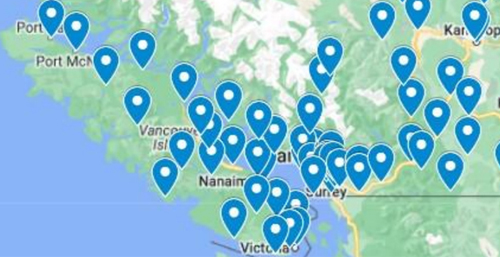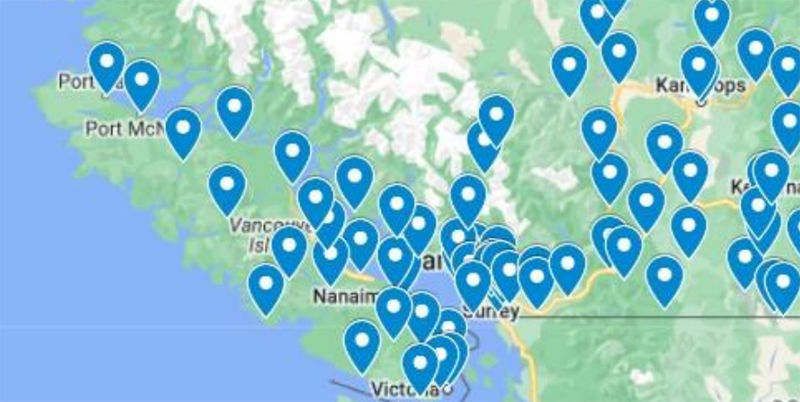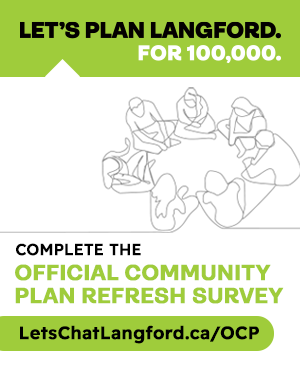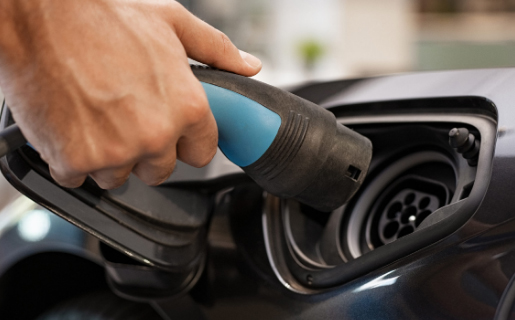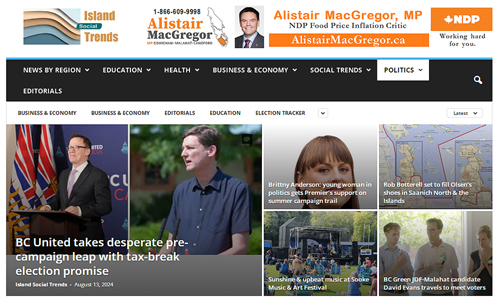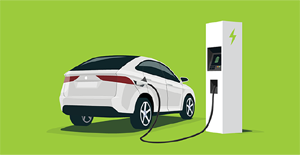Friday September 6, 2024 | VICTORIA, BC
by Mary P Brooke | Island Social Trends
British Columbians will soon be able to drive throughout the entire province in an electric vehicle making clean-energy options more accessible and reliable than ever.
This announcement was made today by Josie Osborne, Minister of Energy, Mines and Low Carbon Innovation with the support of George Heyman, Minister of Environment and Climate Change Strategy and BC Hydro President Chris O’Riley.
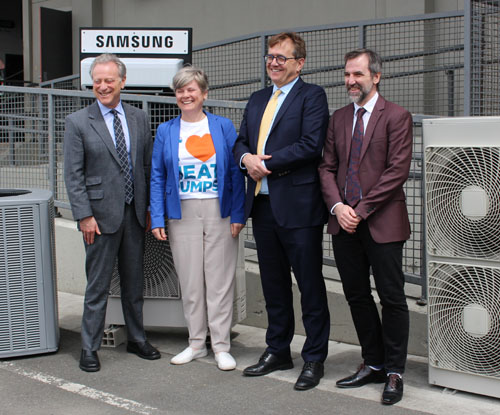
Network of public EV fast-charging stations:
The Province is completing B.C.’s “Electric Highway,” a comprehensive network of public electric vehicle (EV) fast-charging stations along all highways and major roadways located approximately 150 kilometres apart.
Spanning the entirety of the province, B.C.’s Electric Highway will open up EV travel from Alaska all through British Columbia and along the west coast down to California. All B.C. sites will be energized, in service and open to the public before the end of September.
“From unprecedented wildfires, drought and flooding, British Columbians are on the frontlines of climate change. They are seeing the impacts on their communities and making the switch to clean energy – including electric vehicles – in record numbers,” said Josie Osborne, Minister of Energy, Mines and Low Carbon Innovation.
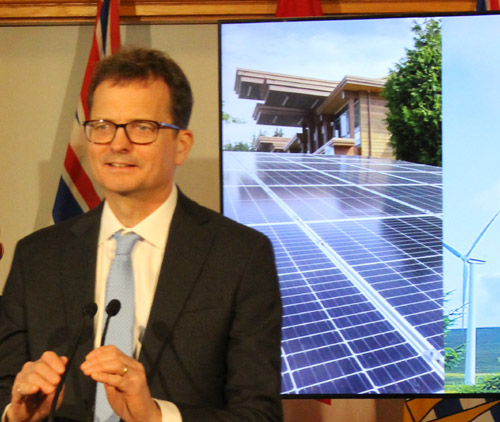
“That’s why we are building out the infrastructure we need to power B.C.’s future with clean, affordable electricity. The completion of B.C.’s Electric Highway is a historic milestone in connecting our province and making clean energy more accessible and reliable,” she said today.
Relieves range anxiety:
B.C.’s Electric Highway network includes 155 charging sites and more than 310 fast chargers, with some sites offering additional Level 2 chargers. The network’s broad geographic coverage ensures that EV drivers can confidently travel anywhere in B.C., knowing they are never far from a fast-charging station.
The network helps address “range anxiety” — a concern of potential EV drivers — by guaranteeing that no part of the province is out of reach for EVs.
Range anxiety is the concern of drivers who feel that their vehicle has insufficient energy storage (fuel and/or battery capacity) and/or that not enough EV charging stations are available, in order to to cover the road distance needed to reach an intended destination. Becoming stranded mid-way between destinations is the fear.
CleanBC accomplishment:
The completion of B.C.’s Electric Highway by summer 2024 fulfills a key commitment of CleanBC, the Province’s climate action plan.
- In addition, the Province is working toward an overall target of building 10,000 public charging stations by 2030.
- As of August 2024, there are more than 5,300 public charging stations in the province, an increase of nearly 350% since 2018.
Switching to electric:
“Making the switch to an electric vehicle means less pollution, and cleaner, healthier air in our communities in addition to lower greenhouse gas emissions. We know that British Columbians need confidence they can charge up easily when travelling throughout our province,” said George Heyman, Minister of Environment and Climate Change Strategy.
“By investing in public charging infrastructure and completing B.C.’s Electric Highway, clean travel options will be more accessible for people and businesses as we continue our work to build a sustainable future for all British Columbians,” says Heyman.
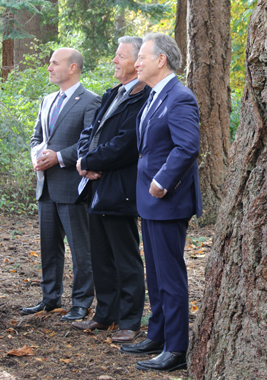
Part of switching to electric is having enough technicians to do maintenance and repairs. In 2021, BC expanded funding support to three post-secondary institutions to deliver Electric Vehicle Maintenance training.
Collaborative effort:
Completing B.C.’s Electric Highway was a collaborative effort involving utilities, local governments, Indigenous communities, the Ministry of Transportation and Infrastructure, and the private sector.
The Province has contributed more than $13 million directly to this initiative through the GoElectric Public Charger Program and additional funding through Natural Resources Canada’s Zero-Emission Vehicle Infrastructure Program.
GoElectric Home and Workplace Charger Program:
In addition to the completion of the Electric Highway, the Province also announced today September 6, 2024, a $14-million boost to the GoElectric Home and Workplace Charger Program.
This funding will support individuals and businesses to install EV chargers at their homes and workplaces, further expanding the accessibility and convenience of electric vehicles in B.C. and making the shift to electric transportation even more seamless.
This initiative, managed by BC Hydro and FortisBC (for their electric utility in the southern Interior), is already accepting applications and is a crucial component of the Province’s broader strategy to make electric vehicle ownership a practical and attractive option for all British Columbians.
400 kW charging stations coming soon:
In another first for British Columbia, BC Hydro will start rolling out 400 kW charging stations, capable of providing up to 100 kilometres of charge in just two to three minutes, early next year.
While no locations have been confirmed, the plan is to place these chargers close to major highways where drivers have the greatest need for charging quickly.
“British Columbians are embracing electric vehicles faster than any other jurisdiction in Canada and that’s why we are continuing to make investments for growth within our current system and building out our fast-charging network across B.C.,” says BC Hydro CEO Chris O’Riley.
“The Electric Highway allows our customers to drive from one end of Vancouver Island to the other, from the Sunshine Coast to the Alberta border and from the southern part of the province all the way to the Yukon border, knowing they’ll have access to reliable charging the entire way,” said O’Riley today in the government news release.
The federal government was promoting the transition to EV vehicles in 2022 with a visit by the Prime Minister at Royal Roads campus, saying that EV usage is necessary as part of Canada reaching its climate targets.
Fortis also on board:
Dawn Mehrer, vice-president of corporate services and technology, FortisBC says that “as part of our efforts to support customers who are making low- and zero-carbon energy choices for transportation, FortisBC is continuing to work with government and stakeholders as we operate a network of fast-charging stations in the southern Interior region, and ensure EV drivers can travel with confidence across B.C.”
“Our participation in the development of EV-charging networks helps to connect communities and supports our electricity customers with smart energy choices,” says Mehrer.
Some quick facts:
- In 2023, approximately 23% of light-duty vehicle sales were EVs, an increase from 18% of sales in 2022, and well ahead of the Province’s targets under the Zero-Emissions Vehicle Act.
- Although EVs have higher purchase costs, they have lower operating and maintenance costs, which save British Columbians money over the lifetime of the vehicle.
- EV owners see immediate savings on fuel costs of approximately $1,800 every year for the average B.C. driver.
- Every EV on the road means a reduction in pollution, resulting in cleaner air, cleaner water and quieter streets.
===== RELATED:
- B.C.’s Electric Highway Map: Expanding B.C.’s Public Charging Network (BC Government, Sept 2024)
- UVic gets $1.5 million for hybrid electric propulsion development (August 6, 2022)
- Electric vehicles necessary to hit climate targets (April 12, 2022)
- Funding to promote electric vehicle uptake in BC (January 9, 2022)
- New BC Centre for Innovation and Clean Energy (July 16, 2021)
- Electric vehicle technician training expands to three more campuses (March 29, 2021)


